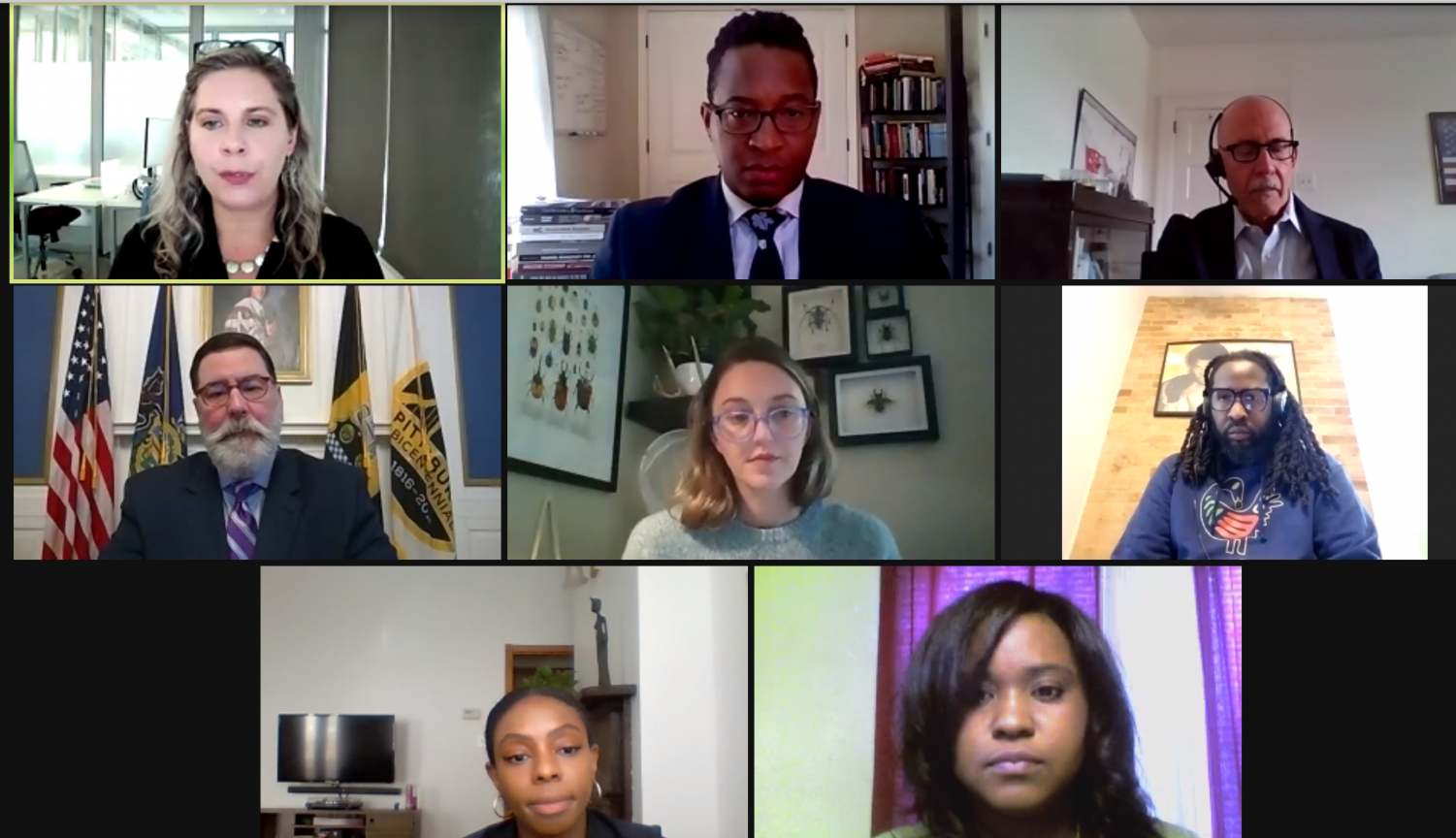Peduto: Expanding, not defunding, is the future of Pittsburgh police


Amid local and national Black Lives Matter protests, Mayor Bill Peduto said at a roundtable on Thursday that reforming the Pittsburgh Bureau of Police requires investing more in the police force rather than defunding it.
“Crime has decreased because our police budget has been increasing,” Peduto said. “If we defund the police what will be cut are the community officers, are the neighborhood officers, are the officers working in order to be engaged with the community.”
Peduto spoke about the City police at a roundtable hosted by Pitt’s Center for Governance and Markets about police reform efforts in the Pittsburgh area. Members of the mayor’s staff joined in the discussion, as well as David Harris, a professor in Pitt’s School of Law, and Brandon Davis, an assistant professor at the University of Kansas School of Public Affairs and Administration. About 170 people joined the Zoom call.
Pittsburgh is budgeted to spend about $115 million in 2020 on its police force, a nearly 50% increase from the force’s $71.5-million budget when Peduto took office in 2013. The mayor said this funding increase is necessary to invest in neighborhood officers, stations in areas with the highest crime rates and technology such as body cameras, as well as to recruit new officers.
“If you want to see something change it requires investment,” Peduto said. “If you’re going to have the kind of police department you want to see with more interaction with the community, it’s going to cost more money. If we just respond to 911 calls, we don’t even have enough officers to do that right now let alone other different requests coming in from the community.”
Peduto added that this economic investment is what he thinks Pittsburghers want, rather than defunding the police. He said he knows this because he has “spent 30 years in Pittsburgh’s Black neighborhoods,” compared to some protestors who “haven’t even been on this earth for 30 years.”
“I can tell you within the neighborhoods the discussion isn’t around defunding the police,” Peduto said. “It’s around we need damn jobs, we need good paying jobs. It’s about we need police not to beat up our grandchildren, we need new opportunities in our community. All of these are a symptom of poverty.”
Harris — who is also a member of the mayor’s Community Task Force on Police Reform — said he agrees with Peduto that most people in Pittsburgh don’t want the police to be defunded, even though that’s what grabs media attention.
“The term defunding and abolishing police is what gets the news coverage and the headlines, but … most people don’t think that way. They want to see a shift in priorities and who has responsibility for the task and then a shift in funding,” Harris said. “They want to see policing reimagined, not done away with.”
Peduto also said he believes most police officers are “good people” and he strongly disagrees with the phrase “ACAB,” or, “All Cops Are Bastards.”
“The saying of ACAB, and I won’t even say what that means, is completely wrong and painting with a broad brush,” Peduto said. “The vast majority of police officers are good people who want to do right.”
But one key group was missing from the roundtable discussion — local Black Lives Matter activists. Miracle Jones, the director of policy and advocacy at 1Hood Media Academy, said discussions that include community members lead to better legislation.
“People with lived experiences have solutions for what keeps them safe, what policing looks like in their own communities,” Jones said. “Not including them in these discussions means we’re going to have the same problematic solutions being regurgitated and repackaged in ways that are not going to impact the people who are most vulnerable to encountering police violence.”
Jennifer Murtazashvili, an associate professor in the Graduate School of Public and International Affairs and director of CGM, organized the event. She said her goal was to promote discussion in the community on police reforms, and specifically included Harris and Davis as a “counterpoint” to the mayor and his staff.
“We’re happy to give the mayor a platform, but we also want to generate debate among stakeholders, among citizens,” Murtazashvili said.
Davis said the police department has a responsibility to build trust among community members, which won’t happen overnight.
“That relationship between the institutions and the citizens is one that goes both ways,” Davis said. “In my time, I’ve been hit in the head with a nightstick by a police officer, I’ve been maced by a police officer, I’ve been extorted for money by a police officer, I’ve been made to lay down in mud by a police officer, I’ve been held at gunpoint by a police officer — that doesn’t go away.”
But Peduto claimed his control over disciplining police officers is limited. He referenced City police officer Paul Abel Jr., who violently arrested a civilian at a farmers market in Squirrel Hill on Sept. 6. The arrest is currently under investigation by the City’s Office of Municipal Investigations.
Peduto said although he “fired” Abel in the past, the “discipline does not stick” because resulting arbitration is “handed off” beyond the mayor. He said this has allowed Abel to retain his position as an officer and forced the City to pay him back pay. Abel has accumulated more than a dozen complaints of alleged misconduct, according to Pittsburgh City Paper.
“I fired Abel, the state law overrode me,” Peduto said. “Not only was I forced to hire him back, but I was forced to pay back salary from taxpayers’ money. If I fire someone in the finance department, they’re fired. We need that type of accountability.”
Peduto said he believes Act 111 needs to be amended to help firings like Abel’s stick. Act 111 of Pennsylvania says police and firefighters are not allowed to strike, and so disputes with union contracts or other matters go to binding arbitration.
“It is the sacred grail of Harrisburg of both Democrats and Republicans,” Peduto said. “If state legislators have the courage to oppose it, maybe we will have a chance to make a difference.”
Olivia Enders, a graduate student researcher in the School of Education who attended the roundtable, said she was disappointed in Peduto’s stance that the police force needed to be expanded. She also said she was disappointed in the lack of panelists who are activists.
“I would have liked to see voices of protestors and local Black activists included in the panel,” Enders said. “They could provide a substantive counter and definition of what ‘defund the police’ and police abolition looks like to those in our community, who were often painted as being fringe or a minority of Pittsburghers.”
During the event, several people asked Peduto questions through Zoom’s Q&A function about the City police’s response to protests in Pittsburgh, including the use of tear gas at protests in East Liberty as well as the arrest of a protest marshal by City police officers in an unmarked van outside Pitt’s Barco Law Building in Central Oakland.
Peduto said it is important that police officers recognize the type of force necessary to respond to a misdemeanor versus a felony.
“If someone is closing a street, which is a misdemeanor, does it really warrant rifles and officers in plainclothes jumping out of an unmarked vehicle, no. That’s a situation you need for sex trafficking,” Peduto said. “When you’re looking at a protest, does it need tear gas when you’re dealing with a misdemeanor, no.”
Peduto also said he “shifted the rules” to allow more than 100 protests since June. He said many of these protests happened without permits.
“Under City code, you cannot block a street without a City permit,” Peduto said. “We have responsibilities to make sure that Port Authority buses get people to where they need to go and public safety vehicles can help people.”
This stance from Peduto stands in contrast to how he responded in a late night tweet after the protest marshal’s arrest outside the law building in the middle of Pitt’s campus.
“The right to assemble is a guaranteed right, the right to shut down public streets, is a privilege,” Peduto wrote.
Peduto added at the event that up until recently, he believed the police force was going beyond necessary actions for deterrence. In the wake of protests, the mayor created a new incident commander position to oversee protests, as well as command positions for civil affairs and public safety community engagement staff, in late August. He also said City police would revise guidelines for its Special Response Team to prohibit “jump-out” arrests by plainclothes officers in unmarked vehicles.
“The action should fit the crime,” Peduto said. “Up until three weeks ago, it seemed like some of the actions we were taking went beyond what is deterrence.”
Jones said substantive change can’t happen if activists are ignored — by the academic community and the mayor.
“People are risking their lives and safety to fight brutality,” Jones said. “There’s a reason why that’s happening. Changes can’t happen if people are being ignored.”
Recent Posts
‘He’s off to a much faster and better start’: Republicans reflect the second Trump administration’s first two months
Since Inauguration Day Trump’s second term has caused division amongst young Americans. Despite these controversies,…
Who Asked? // Why do we accept bad treatment from people?
This installment of Who Asked? by staff writer Brynn Murawski attempts to untangle the complicated…
What, Like It’s Hard? // Lean on your people
Contributing editor Livia LaMarca talks about leaning on your support networks and gives advice on…
Note to Self // Hot Girl Summer
In the sixth edition of Note to Self, Morgan Arlia talks about how she is…
A Good Hill to Die On // Down to Date and Time
In the latest version of “A Good Hill to Die On,” staff writer Sierra O’Neil…
‘Dress for Success: Closet to Career’ alleviates the stress of building a professional wardrobe
As the end of the spring semester rapidly approaches, many Pitt students find themselves in…

